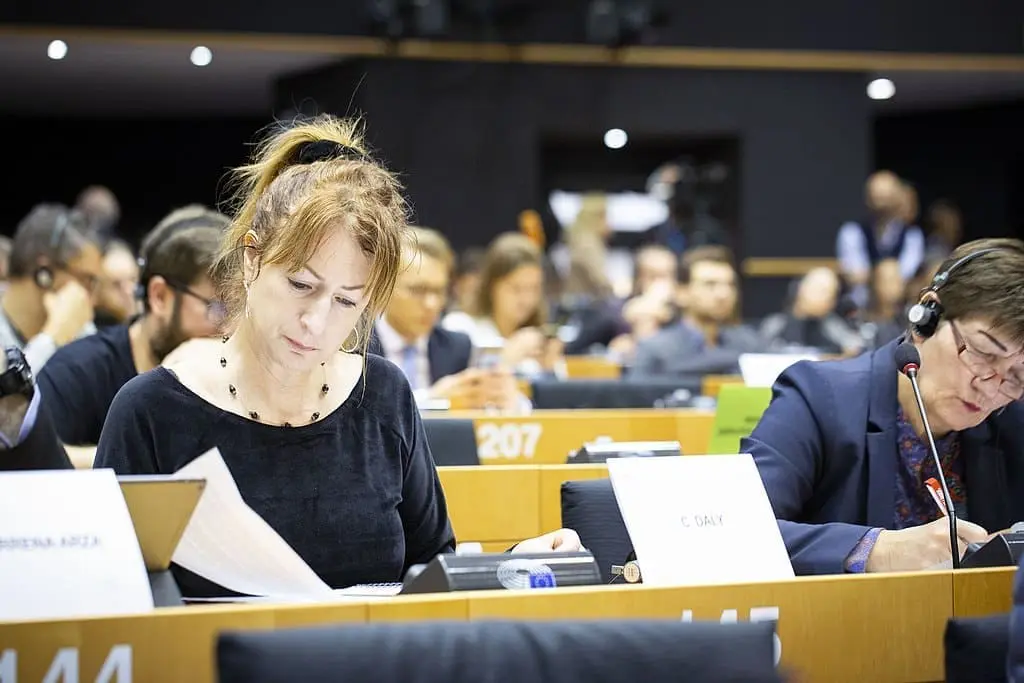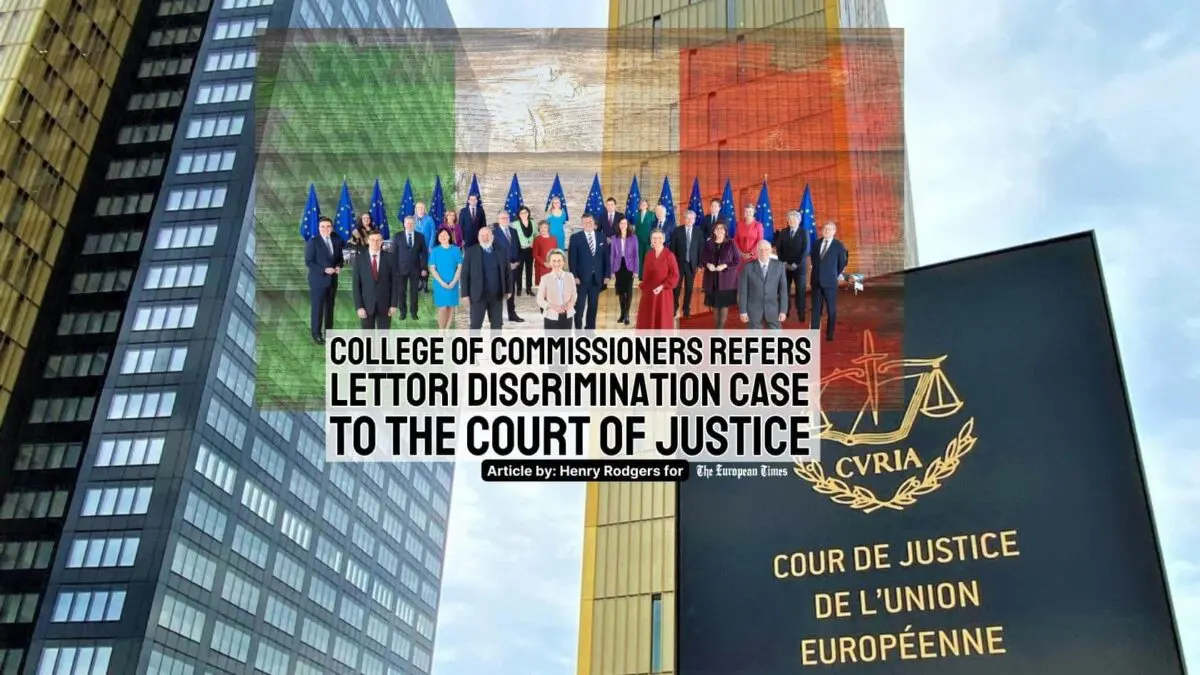Lettori case // Longest-running breach of the parity of treatment provision of the Treaty in the history of the EU nears an end.
The College of Commissioners at its meeting on Friday last unanimously endorsed the referral of infringement proceedings N.2021/4055 to the Court of Justice of the European Union(CJEU). The proceedings, taken because of Italy’s continuing discrimination against foreign language lecturers in Italian universities(Lettori ), were opened in September 2021. The Court has already ruled four times in favour of the Lettori in a line of litigation which extends back to the seminal Allué ruling of 1989.
College’s details about the Lettori case
The College of Commissioners’ decision is recorded under the Jobs and Social Rights portfolio section in the July infringement package. Given the newsworthiness of the College’s decision, a press release, giving additional detail on the case was also published. It records that the case is being referred to the Court because of Italy’s failure to implement the ruling in enforcement Case C-119/04, a ruling which was handed down in 2006.
In their ruling in that case, 13 judges of the Grand Chamber held that a last-minute Italian law of March 2004 was compliant with EU law. The law awarded Lettori a reconstruction of their career from the date of first employment with reference to the parameter of a part-time researcher or more favourable parameters. The law, though it remains in the statute book, has never been implemented.

Following Friday’s decision of the College, interest in this high-profile discrimination case is certain to increase. In enforcement case C-119/04, the Commission recommended the imposition of daily fines of € 309.750 on Italy for decades of discriminatory treatment against Lettori.
The fine was waived because of the enactment by Italy of a last-minute law of March 2004. In an eventual future hearing Italy’s defence team will have the unenviable task of explaining to the Court why the law which spared Italy the recommended fines was never subsequently enforced. Hence, the case has the scope to be a major public and political embarrassment for Italy.
Infringement proceedings pit complainants against member states in breach of their Treaty obligations. It goes without saying that the member states have infinitely greater resources at their disposal for defending their position than the complainants have for proving the persistence of a breach.
The complainants’ relative disadvantage in this regard is added to by the fact that exchanges in infringement proceedings between the Commission and the member state in breach are confidential. Hence, under existing arrangements, a complainant is never fully sure of the Commission’s legal position and intentions.
Against these odds, complainant Asso. CEL.L, a Lettori association founded at the La Sapienza University of Rome, and assisted by FLC CGIL, Italy’s largest trade union, has been providing the Commission with irrefutable evidence of the persistence of Italy’s breach of the Treaty, both prior to and over the course of infringement proceedings N.2021/4055. A number of important morals and lessons on the efficacy of the infringement procedure and the role of the complainant emerge from these experiences.
The Treaty Provisions on infringement proceedings
The 1957 Founding Treaty of Rome empowered the European Commission, as guardian of the Treaty, to take infringement proceedings against Member States for perceived violation of their Treaty obligations. Later, the Treaty of Maastricht further empowered the Commission to take follow-on enforcement cases for non-implementation of earlier infringement rulings, and the Court to impose pecuniary penalties on Member States where it deemed the Commission had proven its case.
These measures, particularly when taken in tandem, would seem adequate to remedy breaches of EU law in that rational member states would comply rather than pay heavy daily fines.
In the Lettori enforcement case, the Court waived the daily fines proposed by the Commission because Italy enacted last-minute legislation which the Court judged to be compliant with EU Law. However, Italy never subsequently enforced its legislation.
Hence the Commission had to revert to the first stage and start fresh infringement proceedings, thus prolonging a case which should have been resolved with the enforcement procedure.
Repetition of this unfortunate outcome could be avoided by verifying with the complainant that enacted member state legislation has in fact been enforced.
The complainant

In the Lettori case, the infringement proceedings were preceded by a pilot case, which ran on for ten years. Nearing retirement, and despairing of ever receiving justice, a group of Lettori at “La Sapienza” University of Rome formed Asso.CEL.L and applied for and obtained the status of an official complainant with the Commission.
With a mix of skills in law, statistics, data processing, Asso.CEl.L resolved to improve the quality of representations to the Commission and persuade it to move to infringement proceedings properly. A new professionalism was evident in the organization of a nationwide census of Lettori, conducted with the cooperation of FLC CGIL, which documented to the Commission’s satisfaction that the universities had not implemented the CJEU ruling in Case C-119/04.
A thorough knowledge of EU law and procedure is essential for a complainant. To his end, Asso.CEL.L set up a web page to educate colleagues on Lettori case law before the European courts.
Resources
Asso.CEL L is unique among Lettori representative organizations in that it has never accepted contributions. The negligible to zero cost of modern means of information communication and virtual meetings means running costs are very low.
Freed of the need to canvass for contributions and the bureaucratic requirement to compile and justify annual accounts, Asso.CEL.L has been able to devote its best energies to the infringement proceedings.
The moral here is that would-be complainants should master modern means of internet communication to keep their running costs low.
Relations with trade unions
In discrimination against non-national workers cases the support of a domestic trade union is invaluable. That FLC CGIL, Italy’s largest trade union, called on the Commission to prosecute Italy for its discriminatory treatment of non-national workers carried great weight.
With its impressive national organization, the cooperation of FLC CGIL proved essential to the success of the nationwide Lettori census. The same on-the-ground organization facilitated the success of the three protests held this academic year, on December 13, April 20, and most recently in the national strike of June 30.
The Press
It is obvious that good media coverage helps the cause of a complainant. In the university cities of Padova, Florence (1), and Perugia (2), local Italian TV was generous in coverage of the Lettori strike of June 30. The audience response was very supportive.
At the European level, The European Times has consistently reported on the Lettori case from the opening of the infringement proceedings to the referral of the case by the College of Commissioners to the Court of Justice. For funded organizations, there will always be a temptation to indulge in propaganda to maintain subscription income.
In its relations with the press Asso.CEL.L has always followed a policy of never trading accuracy for advocacy. This policy has been facilitated by the European Times policy of providing substantiating web links to Lettori case law.
The Parliamentary Question

Though exchanges between the Commission and member states in perceived breach of their Treaty obligations are confidential in infringement proceedings, the Commission must reply to parliamentary questions from MEPs.
Intelligent use of the parliamentary question can help a complainant’s case and such use also has a positive public relations value.
Dublin MEP Clare Daly has kept the Lettori case before the EU conscience, both through her speeches in the European Parliament and her questions co-signed by other Irish MEPs to the Commission. The last of these questions successfully called on the Commission to refer the Lettori case to the CJEU.
Conclusion
On university campuses across Italy on Friday the Commission’s decision to refer the Lettori case to the CJEU was warmly welcomed. Though geographically remote from the Lettori in Brussels, there was recognition that the Commission had been attentive to the representations of Asso.CEL.L and FLC CGI in its conduct of the infringement proceedings.
MEP Clare Daly said :
“The decision of the Commission to refer the Lettori case to the Court of Justice is very welcome. Workers’ rights under the Treaty must be respected across the EU. I will continue to liaise with the official complainant Asso.CEL.L and with my fellow MEPs to ensure that the Lettori receive the settlements for the reconstruction of career due to them under EU law.”
____________
(1) From 04.00 to 06.30
(2) From 04.40 to 06.47







